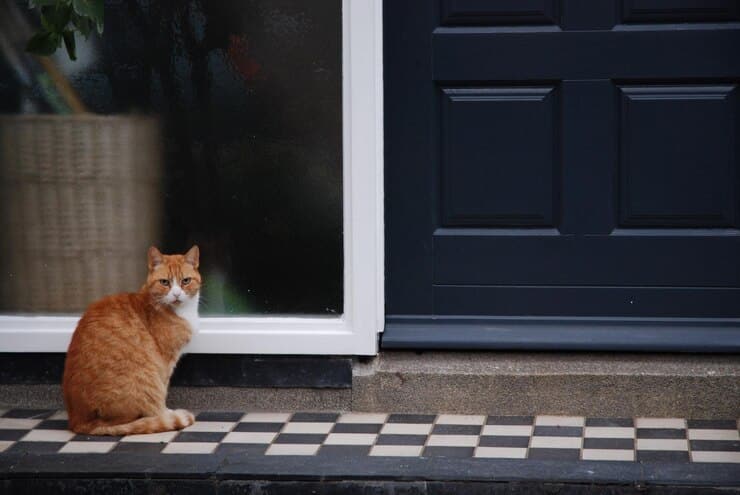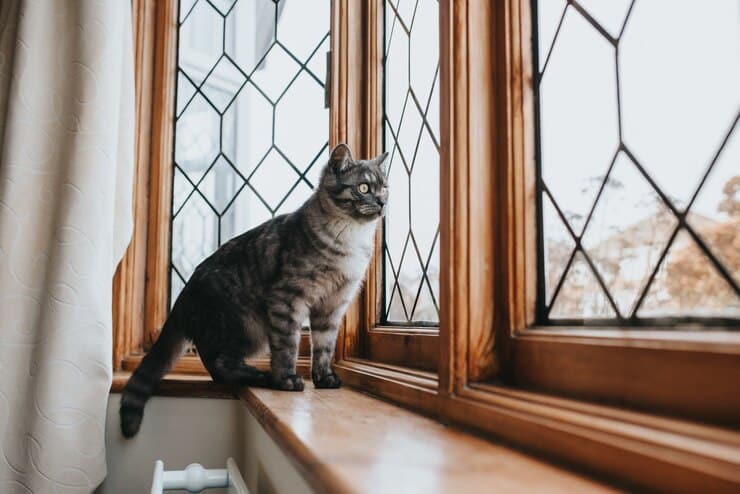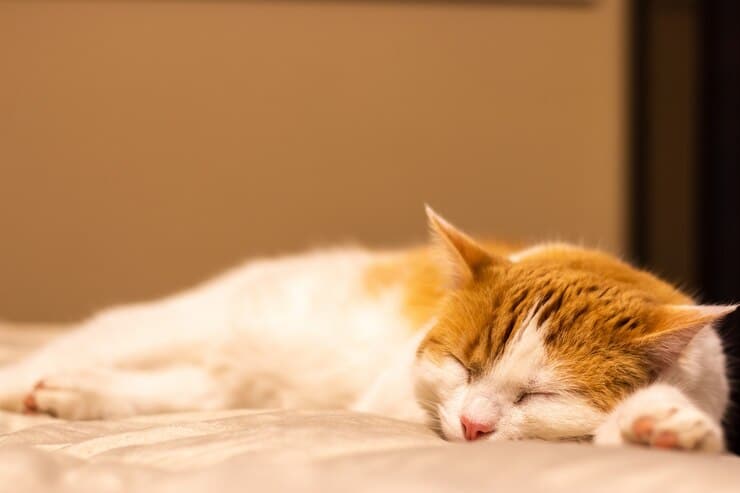Introduction

Image Credit: Freepik
Cats often leave us perplexed, with their personalities and peculiar habits. One behavior that surprises cat owners is when their feline companion consistently waits outside the bedroom door. In this article we will delve into the question; “Why does my cat sit outside my bedroom door?” Our goal is to uncover the layers of feline psychology and behavior that drive this act.
This seemingly simple yet puzzling action could have reasons behind it ranging from seeking affection to health concerns. By the end of this piece you will gain an understanding. Perhaps find an answer to this intriguing question.
Join us as we explore the explanations for this behavior. Continue reading to discover reasons, behind it what your cat might be trying to communicate with you and how you can address or discourage this behavior. Lets get started!
Table of Contents
Common Reasons: Why does my cat sit outside my bedroom door?

Image Credit: Freepik
Cats have a knack, for being creatures of habit and keeping their companions both fascinated and puzzled by their behaviors. One particular behavior that often intrigues us is when they wait outside our bedroom doors and there can be reasons behind it.
One main reason is their desire for attention or companionship. Despite cats being known for their independence they actually form bonds with their owners. Waiting outside the door might be their way of seeking your company or attention especially if they’re accustomed to receiving affection and playtime in the mornings or evenings. It’s, like their way of saying, “I want to spend time with you.”
Curiosity also plays a role. Cats are naturally creatures. A closed door presents a puzzle that many cats feel the need to figure out.
Having a routine and habits is another aspect of how cats behave. If a cat has gotten into the habit of sleeping or spending time near the bedroom they might continue doing out of habit.
Finally if a cat waits at the door it could mean they want to come or go out of the room. This is especially true if they’re used to sleeping in the bedroom and find themselves outside. On the hand it could also indicate health concerns such, as anxiety or physical discomfort which may lead them to seek comfort from their owner.
Understanding these motivations helps strengthen the bond between cats and their owners and provides insights, into the world of behavior.
Exploring Cat Psychology and Behavior
Understanding the psychology and behaviors of cats provides insights, into why your beloved furry friend may wait outside your bedroom door. Cats are creatures with behaviors that stem from their past and unique life experiences.
At the core of behavior lies the desire, for safety and comfort. Cats are beings and your home your bedroom is a vital part of their perceived territory. This space offers them a sense of security and familiarity. When your cat lingers outside your bedroom it might be expressing its ownership of that area which it deems significant in its territory.
The way humans interact with cats plays a role, in influencing their behavior. Cats tend to form connections with their owners. Can develop certain habits based on these interactions.
For instance if you spend an amount of time in your bedroom your cat may choose to wait outside the door as a means of staying near you.
This behavior is indicative of their fondness, for you and the sense of security they feel when you’re around.
It’s crucial to take into account that every cat has its personality and preferences. What might indicate affection, in one cat could indicate stress or anxiety, in another. By observing your cats behavior and surroundings you can gather hints to better comprehend its actions.
Health Concerns That Might Cause This Behavior
Sometimes when cats wait outside bedroom doors it’s not, about their instincts and habits. It’s important to consider that there could be underlying health issues behind this behavior. As owners we should be aware of these possibilities.
One common health concern that may cause such behavior is a tract infection (UTI). Cats with UTIs or other urinary problems often feel uncomfortable. Seek solace in the presence of their owners.
So if your cat suddenly starts waiting outside your door and also shows signs like urination or meowing it could indicate a problem like this.
Kidney disease is another condition that can affect a cats behavior. Cats with kidney issues may experience discomfort or pain which makes them seek comfort from their owners.
Similarly diabetes in cats can lead to changes in behavior due to fluctuating blood sugar levels resulting in increased attachment or anxiety.
Arthritis among cats could be another reason for this behavior. Being close, to their owner provides warmth and comfort that helps alleviate the pain and discomfort associated with problems.
Lastly, mental health concerns like anxiety or stress can significantly impact a cat’s behavior. Cats are sensitive to changes in their environment or routine, and such changes can manifest in behaviors like waiting outside your bedroom door.
The Cat’s Perspective: Sleeping and Territory Habits

Image Credit: Freepik
To truly grasp the reasons, behind your cats choice to wait outside your bedroom door it’s crucial to consider things from their perspective especially when it comes to their sleep and territorial tendencies. Cats are creatures driven by comfort and instinct with ingrained behaviors that shape their nature.
Cats often select their sleeping spots based on factors like coziness, safety and the need to keep an eye on their surroundings. Your bedroom, being a tranquil and warm space might be particularly appealing to them.
However if they are not allowed inside or have a habit of sleeping by the door they may continue doing out of familiarity. This behavior stems from both their need for security and their desire to be close to you.
Territorial behavior is another aspect in cats. Your bedroom holds a wealth of scents that’re unique to you; thus it represents a part of their territory. By waiting at the door they might be claiming this area as theirs. Asserting their presence in what they perceive as a space, within the household.
Interesting Topic: Why Do Cats Flop?
Managing and Modifying Your Cat’s Behavior
To handle and control your cats behavior when they wait outside your bedroom door it’s important to comprehend their needs and motivations. By guiding them towards habits you can address this situation effectively.
This approach necessitates patience, consistency and a deep understanding of how cats behave.
Firstly it’s important to figure out why your cat is behaving this way. Is your cat looking for attention feeling anxious or reacting to a change, in their surroundings?
Once you understand the cause you can adjust your approach accordingly. If your cat is seeking attention make sure to spend time playing and showing affection throughout the day. This can help fulfill their need, for interaction and reduce their reliance on staying in your bedroom.
Lastly positive reinforcement can be a tool. Reward your cat with treats or affection when they choose to rest in their designated spot of by your door. Over time this positive association can encourage them to find more preferable resting areas.
The Bedroom Dilemma: To Let In or Not Let In?
Deciding whether or not to allow your cat, in your bedroom is a decision that comes with its set of advantages and disadvantages. Understanding these can assist you in making a choice that benefits both you and your furry companion.
One of the benefits of having your cat in your bedroom is the strengthening of the bond between the two of you. Cats are animals. Sharing a sleeping space can enhance feelings of companionship and trust.
Furthermore for some owners having their cat nearby at night can provide comfort. Potentially improve the quality of sleep.
However it’s important to consider drawbacks well. Allergies are a concern, for individuals. Cat dander and hair have the potential to trigger reactions, which can make it challenging to maintain a sleeping environment.
Furthermore, cats can be nocturnal and may disrupt your sleep pattern with their nighttime activities.
It’s also important to take into account the health and happiness of your cat. Some cats may become too reliant on their owners, which can lead to separation anxiety when the owner is away. Making sure that your cat is comfortable being alone is crucial, for their well being.
When making your decision think about your lifestyle, health as the personality and needs of your cat. If you choose to allow your cat in the bedroom make sure to address any issues by keeping things clean and providing a sleeping area, for your cat.
Creating a Comfortable Environment for Your Cat
Creating an welcoming environment, for your cat is crucial to their happiness and can greatly influence their actions, such, as waiting outside your bedroom door. Here are some important factors to keep in mind when setting up the space for your companion;
- Suitable Sleeping Arrangement
- Address Litter Box Issues
- Environmental Familiarity
- Routine Checks
- Provide Mental Stimulation
- Consider Companion Animals
- Use of Pheromones
- Positive Reinforcement
By incorporating these techniques you can establish a setting that supports your cats health and happiness decreasing the chances of them lingering outside your bedroom and nurturing a bond, between you and your beloved feline friend.
Interesting Topic: Why does my cat keep following me after giving birth?
When Your Cat Refuses to Sleep in Your Bedroom
While many cats enjoy sleeping to their owners at night some may have preferences. It’s important to respect your cats choices if they refuse to sleep in your bedroom and find ways to ensure their comfort.
Ensure They Have a Cozy Bed:
Make sure your cat has an snug sleeping spot else, in the house.
Keep the Bedroom Door Open:
If your cat prefers to wander during the night leave your bedroom door open. This allows them to come and go as they please giving them a sense of freedom and independence.
Be Patient;
Cats may need time to adjust to changes in their sleeping arrangements.
Consult Your Veterinarian;
If your cats reluctance to sleep in your bedroom is accompanied by changes or health concerns it’s advisable to seek advice from your veterinarian. They can help rule out any issues and provide guidance, on behavior modification if necessary.
Conclusion
When we delve into the question “Why does my cat sit outside my bedroom door?” we discover a combination of curiosity, routine and a longing, for companionship. Although this behavior may seem perplexing it actually reveals the psychology of cats and the special bond they form with their owners.
Whether it stems from instincts or concerns about their well being comprehending this conduct helps strengthen our connection, with our friends and grants us valuable insights into their fascinating world. Ultimately each cats unique personality greatly influences why they engage in captivating behaviors near our bedroom doors.
Let us know in the comments section below and feel free to view our other articles on catsra.


